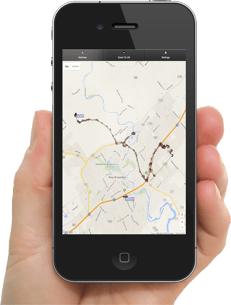 Small business fleet managers need a competitive edge. Depending on your unique business objectives, there may be a GPS tracking app that can help you get ahead of the competition. It’s a matter of streamlining your business into a smooth-running operation that runs efficiently and economically, resulting in increased customer satisfaction.
Small business fleet managers need a competitive edge. Depending on your unique business objectives, there may be a GPS tracking app that can help you get ahead of the competition. It’s a matter of streamlining your business into a smooth-running operation that runs efficiently and economically, resulting in increased customer satisfaction.
Read on to find out how app-based GPS can help a small biz fleet manager.
1. Navigation
There are a wide variety of navigation apps on the market, and like the well-known Google Maps, they provide web mapping services to help drivers find destinations quickly. Typically, these apps provide navigation tools that include satellite imagery and traffic reports/route estimates. Most navigation apps provide turn-by-turn directions and real-time traffic updates that select the best routes, and even the best lane to be in.
2. Employee Time Tracking
An employee time tracking system allows fleet managers to monitor what their team is doing, and eliminates a lot of the paperwork involved. The benefits of time tracking software, include:
- Tracking time and location of all employees automatically
- Setting weekly limits for employees
- Automating payment scheduling
- Work calendars, that provide shift information, and give alerts for schedule changes, tardiness, or absences
3. Route Optimization
When choosing a gps route optimization app, consider the parameters that drive your business. The software available includes maps that have up-to-date information about congestion, construction, road speeds, commercial vehicle restrictions, and more.
This ongoing data allows routes to be flexible according to the day-to-day conditions of the road. Routes are instantly created that are the most economical and efficient based on the customer’s location, vehicle capacity, and driver needs. Route optimization software can integrate work order information, service time windows, and work constraints with comprehensive street and truck-safe route information. The app significantly reduces planning time, driving time, and total miles driven while increasing on-time deliveries and customer satisfaction.
4. Compliance
Some app-based GPS systems track driver Hours of Service (HOS) to ensure compliance with HOS regulations. Fleets of all sizes are required to meet new regulations for using electronic logging devices (ELDs) for records of duty status. The implementation of ELDs for fleets is December 18th, 2017. The ELD rule is designed to prevent driver fatigue, and an app that handles compliance requirements can help your small business by:
- Eliminating paperwork and reducing administrative time
- Minimizing violations
- Providing up-to-date logbook data
5. Driver Performance
Before app-based GPS, it was not possible for fleet managers to monitor what the driver was doing, or how he was performing. Now software can provide insight into the driver’s actual driving performance. Safety factors, such as speed, sharp corner turns, and braking habits can all be closely monitored, with alerts being sent to fleet managers when safety violations occur.
Performance benchmarks can be established for each driver based on the gathering of their daily, weekly, or monthly driving actions. The driving details of an individual can be continuously compared to company policies, and fleet managers can easily monitor policy violations.
6. Fuel Tracking
Fuel tracking apps give fleet managers comprehensive data about fuel usage such as MPG, cost per mile, and the distance between tank fill ups. Some apps allow drivers to input fuel costs, fuel volume, and upload a photograph of the fuel receipt instantly on a mobile phone or tablet. Vehicle fueling locations are also tracked, providing a detailed record of all fuel purchases.
Need a competitive edge? Choose single apps that detail specific objectives, or invest in a fleet management app that integrates many of the features you desire. With these you can save time, save money, increase productivity, and enhance customer satisfaction.






